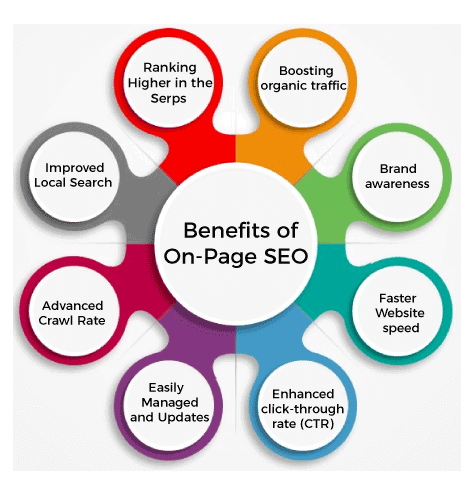The Importance of On-page SEO and How to Optimize Your Content
Jun 6, 2023 | by Allen Glenn
Here are some of the benefits of on-page SEO:
- Increased website traffic: When your website ranks higher in SERPs, you will receive more traffic from search engines. This can lead to more leads and sales for your business.
- Improved brand awareness: When your website is visible in SERPs, it will help to improve your brand awareness. This can lead to more people knowing about your business and what you offer.
- Increased credibility: When your website ranks high in SERPs, it will appear more credible to potential customers. This can lead to more people trusting your business and choosing to do business with you.

Here's how you can optimize your content for on-page SEO:
-
Keyword Research:
- Identify relevant keywords related to your content and target audience.
- Use keyword research tools to find keywords with good search volume and manageable competition.
- Incorporate these keywords naturally into your content.
-
Title Tags:
- Include the target keyword in the title tag, preferably towards the beginning.
- Keep the title tag concise, compelling, and within the recommended character limit (typically 50-60 characters).
- Make sure the title tag accurately represents the content of the page.
-
Meta Descriptions:
- Craft unique meta descriptions for each page.
- Include the target keyword or a related phrase in the meta description.
- Write engaging and descriptive meta descriptions that entice users to click through to your page.
- Keep meta descriptions within the recommended character limit (typically 150-160 characters).
-
URL Structure:
- Use descriptive and keyword-rich URLs that accurately reflect the content of the page.
- Avoid using complex or excessively long URLs.
- Separate words in the URL with hyphens (-) instead of underscores or spaces.
-
Header Tags:
- Utilize header tags (H1, H2, H3, etc.) to structure your content and highlight important sections.
- Incorporate relevant keywords in the headers to provide search engines with an understanding of your content's organization and hierarchy.
-
Keyword Placement:
- Include your target keyword naturally in the first paragraph of your content.
- Sprinkle related keywords throughout the content to provide context and relevance.
- Avoid keyword stuffing, as it can harm your SEO. Focus on creating high-quality, informative content.
-
Content Optimization:
- Create high-quality, engaging, and valuable content that matches the user's search intent.
- Ensure your content is well-structured, easy to read, and incorporates subheadings, bullet points, and paragraphs.
- Use images, videos, and other multimedia elements to enhance your content and improve user experience.
- Aim for a sufficient word count to provide comprehensive coverage of the topic. Longer content tends to perform better in search results.
-
Internal and External Linking:
- Include internal links to relevant pages within your website to improve navigation and help search engines understand the relationships between your pages.
- Incorporate external links to credible and authoritative sources that add value to your content.
- Ensure all links are working correctly and use descriptive anchor text.
-
Mobile-Friendliness and Page Speed:
- Optimize your website for mobile devices to provide a seamless user experience across different screen sizes.
- Improve your page load speed by optimizing image sizes, minimizing code, and leveraging caching techniques.
-
User Experience:
- Prioritize user experience by making your content easy to navigate, readable, and visually appealing.
- Use clear headings, subheadings, and formatting to improve scannability.
- Ensure your website is accessible, with good site structure, intuitive navigation, and a clear call-to-action.
- Title tag: The title tag is the main headline that appears in SERPs, and it's one of the most important on-page SEO factors. The title tag should be descriptive and include the target keyword or phrase.
- Meta description: The meta description is a brief summary of the page's content that appears in SERPs. The meta description should be informative and persuasive, and it should encourage users to click on the page.
- Header tags: Header tags (H1, H2, H3, etc.) are used to organize the page's content and make it easier for search engines to understand. Header tags should be descriptive and use the target keyword or phrase.
- Content: The content of the page should be high-quality, informative, and relevant to the target keyword or phrase. The content should be original and well-written, and it should be free of errors.
- Internal links: Internal links are links from one page on your website to another. Internal links can help improve your website's overall SEO by increasing crawlability and authority.
- Image alt text: Image alt text is the text that appears when an image is not able to be displayed. Image alt text should be descriptive and include the target keyword or phrase.
- Mobile-friendliness: Search engines now prioritize mobile-friendly websites in SERPs. Make sure your website is responsive and displays well on mobile devices.
- Security: Search engines prefer websites that are secure. Make sure your website uses HTTPS and has a valid security certificate.
Here are some additional tips for improving your website's on-page SEO:
- Use long-tail keywords. Long-tail keywords are more specific and less competitive than short-tail keywords. This means that it's easier to rank for long-tail keywords.
- Create fresh, high-quality content on a regular basis. Search engines reward websites that publish fresh, high-quality content.
- Optimize your images for SEO. This includes using descriptive alt text and adding keywords to your image titles.
- Use social media to promote your website. Social media can help you drive traffic to your website and improve your SEO.
- Monitor your website's SEO performance. There are a number of tools that can help you track your website's SEO performance. By monitoring your performance, you can identify areas where you can improve your SEO.








